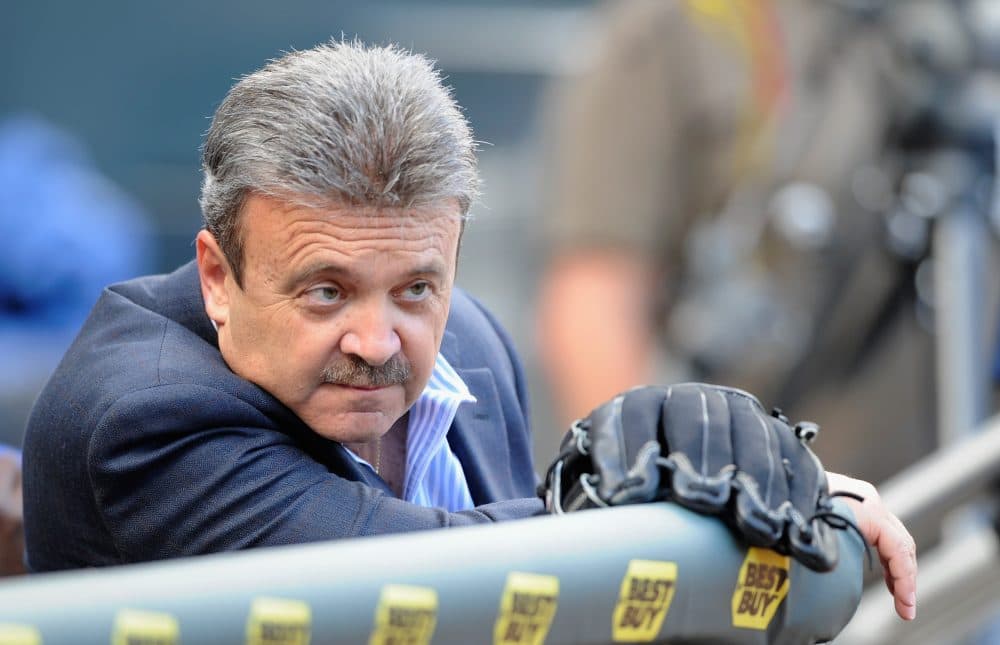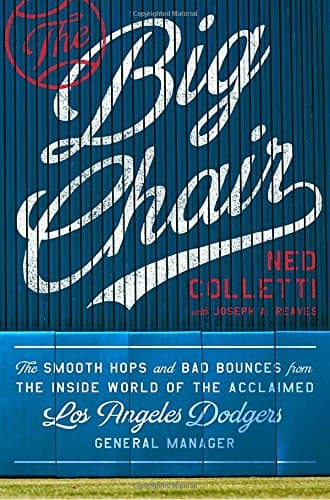Advertisement
The Story Of A Trade: Former MLB GM Ned Colletti On His Time In 'The Big Chair'

I’m a baseball fan, but that doesn’t mean I’m a fan of everything that takes place in baseball. Though, like lots of fans, I’ve sometimes been curious about the inner workings of the game as it’s played in front offices and in the rarefied precincts occupied by billionaire team owners.
That’s why I was interested in a story I heard this week from Ned Colletti.
'In Sports, You’ll See Fact Or You’ll See Fiction'
From November 2005 until October 2014, Ned Colletti was general manager of the Los Angeles Dodgers. His boss was Frank McCourt, the team’s owner.
"I think Frank McCourt was one of the smartest people I’ve ever worked for or been around," Colletti says. "He taught me a lot."
One of the starting pitchers with the Dodgers when Colletti joined the front office was Odalis Perez. A few years previous, in 2002, Perez had won 15 games and made the all-star team.
"He was one of the better left-handed pitchers in the game for a short period of time," Colletti says.
Fairly soon after Ned Colletti joined the Dodgers, he began to feel that Perez was no longer the pitcher he’d been.
"The contract — he received a big contract — and was well paid," Colletti says. "And it seemed that it corresponded almost with a fallback in performance."
As Ned Colletti saw it, Odalis Perez liked being a big league pitcher — it was a great life. But once Frank McCourt had given him a big raise, he wasn’t so crazy about working at his trade.
One two-day stretch early in May of 2006 seemed to demonstrate that Colletti was right. The night before a game Perez was scheduled to pitch against the Diamondbacks in Phoenix, Frank McCourt encountered the pitcher to whom he was contractually obligated to pay about $9 million that season.
"He had walked into the hotel," Colletti says, "and seen Odalis Perez in the lobby with some buddies, and it appeared that he had had a couple beers, or whatever, and was kind of taking it easy and relaxing on the couch. And Frank said, 'You know you’re pitching tomorrow.' And Odalis says, 'Yeah, yeah. It's no big deal. Everything will be OK.'"
Owner McCourt felt this was something General Manager Colletti should handle.
"He says, 'You know, your starting pitcher is in the lounge here at the Westin?'" Colletti recalls McCourt saying. "And I said, 'Really?' And he says, 'Yeah, and it looks like he may not be prepared for tomorrow.' And I said, 'I’ll take care of it. I’ll handle it.'
Advertisement
"I went back and I made sure that he was out of the hotel lobby and expressed upon him that, 'Hey, we got a big game tomorrow, so be prepared.' He said, 'Don’t worry about it. Everything will be all right.'"
"Did you believe him?" I ask.
"Well, it didn’t matter if I believed him or not," Colletti says. "In sports, you’ll see fact or you’ll see fiction."
'No Big Deal,' Right?
For a time, the next day, it appeared that it would be, as Perez had asserted, “no big deal.”
"Well, he was effective through the first few innings," Colletti says, "and then he actually got on base and had to run the bases."
This, Ned Colletti says, is where the triangular relationship involving pitcher, GM and owner began deteriorating more dramatically. Circumstances conspired to require Perez to score from first on a double. Having done so, he lay flat on his back beside home plate for considerably longer than is customary.
"And he looks like he’s winded," Colletti says. "And when he goes out the next inning, Arizona just kept taking it to him. Kept scoring runs. Kept making the inning longer and longer. That one particular inning — whether it was the exertion of running the bases or whatever it was — when he came out to pitch that next half inning, he wasn’t the same."
Unhappily for Odalis Perez, that night the boss was in attendance. Frank McCourt stormed into the box where Ned Colletti was sitting. He was angry enough so that Colletti had to remind him that any tantrums he threw at the ballpark would end up on national TV.
After the game, McCourt was no less exercised.
"And he says, 'We gotta move him. We gotta get him off the team, no matter what it’s gonna take. Move him even if you gotta eat the contract,'" Colletti recalls.
That was OK with Colletti, who didn’t get along especially well with Perez anyway. As noted, he thought Perez was only playing for the money, rather than on behalf of “Dodger Blue” or for some more lofty, less tangible purpose.
That concept of playing for the money, and playing with lots and lots of money, is worth filing away. Some players do it. As it turns out, so do some owners.
Anyway, shortly after his conversation with the owner, Ned Colletti did what he was told. He traded Odalis Perez to Kansas City, even though it meant the Dodgers had to pay a portion of his salary while he was pitching for the Royals; that is, eat the contract. Colletti recalls the day he gave Perez the news:
"Some guys are very upset," Colletti says. "Some guys don’t want to leave. Once in a while a player is happy for a change of scenery — the chance to go play some place else. In his case, he was upset. He was a little teary-eyed that he had to go."
Ned Colletti and Odalis Perez have not spoken since Colletti told the pitcher he’d have to go. Over the next three seasons, Perez went 17-27 for Kansas City and then the Washington Nationals. By the fall of 2008, he was out of baseball. Nobody was too surprised. Lots of players’ careers end that way.
A Lavish Life And A Pricy Divorce
But what happened next to the owner who’d wanted Perez gone was not so routine.
2009, the year Odalis Perez stopped pitching, found Frank McCourt mired in a divorce, which included a battle over whether McCourt or his wife would get the Dodgers. According to a 2011 story in Vanity Fair, that divorce cost $20 million in attorney's fees alone. Even for a man who’d once spent $12 million on a swimming pool for one of his four homes and $10,000 a month for a personal stylist to trim his hair five times a week, that was serious money. Enough to suggest that having a lot of money and what it could buy mattered at least as much to Frank McCourt as it did to Odalis Perez.

Unhappily for McCourt, MLB Commissioner Bud Selig balked when he learned the owner had allegedly diverted over $100 million from the Dodger accounts to cover personal expenses — perhaps that hair stylist. The commissioner appointed a guy to oversee McCourt’s checkbook.
Eventually, McCourt declared bankruptcy and sold the team. By May 2012, he, too was out of baseball.
The same can’t be said of Ned Colletti. He’s still an advisor to the Dodgers, and he broadcasts some of their games. He’s recently written a book, The Big Chair, about his years as a general manager. For that book, he remembered not only that Odalis Perez wept when Colletti traded him, but that shortly thereafter, in an interview with ESPN Deportes, Perez contended that the L.A. front office had lied to him and “treated him like garbage.” This can’t have been pleasant for Ned Colletti to hear. But time heals, sometimes. I wondered if it had done so, or might.
"What would you say," I begin to ask Collettii, "if Odalis Perez were to call you up and say, 'Hey, I’m trying to kinda make sense of my life, post-baseball. How about we get together, have a cup of coffee and talk about what happened when I was with the Dodgers?'"
"I’d say, 'Let’s do it today.'” Colletti says.
Were Ned Colletti to initiate that call, he might have a problem. Our efforts to contact Odalis Perez were in vain. On the other hand, if Ned Colletti wants to get in touch with Frank McCourt, no problem. He currently owns a pro soccer team in France.
This segment aired on October 7, 2017.
